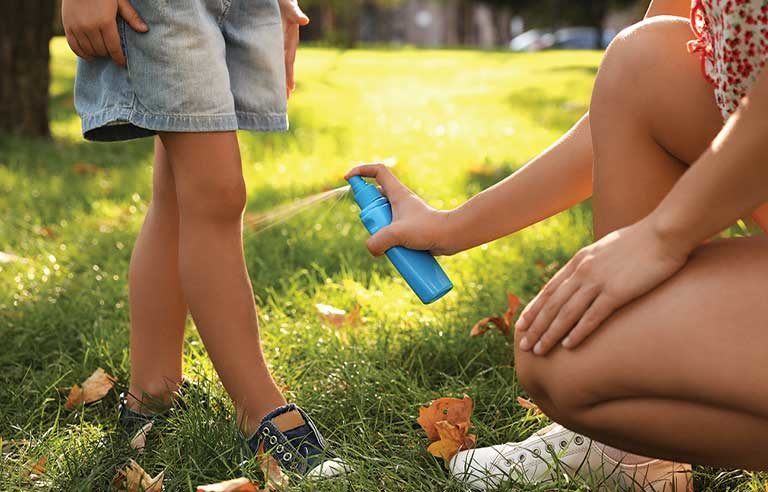Buzz off, mosquitoes!
Tips for using repellents safely

Photo: Liudmila Chernetska/iStockphoto
Warm summer evenings mean spending time outdoors: dining alfresco, taking in a concert or game, or simply enjoying a walk around the neighborhood.
They also mean mosquitoes. No one invited these nuisances, but they show up anyway. And their itchy bites carry the risk of viruses such as West Nile and Zika.
Sprays and repellents can help keep mosquitoes at bay – when they’re used the right way. Let’s take a look.
DEET-ails
The American Academy of Pediatrics says you shouldn’t use insect repellents on infants younger than 2 months. (The Centers for Disease Control and Prevention recommends buying a mosquito net for your baby carrier.)
For everyone else, topical repellents containing DEET are popular and have been shown to be effective. The concentration of DEET in a product reflects the period of time it’s expected to be effective. Higher concentrations work longer.
So, a product with 10% DEET offers protection for up to two hours, while products with 30% DEET are effective for about five hours, the AAP says, adding that concentrations of 50% or greater don’t offer any added protection.
Several other repellents are registered with the Environmental Protection Agency, including picaridin, IR3535, oil of lemon eucalyptus, para-menthane-diol, and 2-undecanone.
Not sure which is right for you? The EPA has an online search tool that can help. Go to epa.gov/insect-repellents/find-repellent-right-you to find it.
Ready to use
Read and follow label directions for proper use of insect repellents. And only use repellents on exposed skin and/or clothing – not under your clothing.
Here are some more “don’ts” from the EPA:
- Don’t apply repellents near your eyes and mouth, and use only a little around your ears.
- Don’t spray directly into your face. Instead, spray on your hands and apply to your face.
- Don’t use repellents on cuts, wounds or irritated skin.
- Don’t spray in enclosed areas, inhale spray or spray near food.
- Don’t use the product near open flames if the label includes warnings about flammability.
Once you’re back inside, be sure to wash your skin and the clothes you were wearing.
Keep kids safe
Kids often put their hands in their mouth or touch their eyes, so don’t apply repellent to their hands and let them apply it. Instead, spray it onto your own hands and apply it to your child’s skin.
Use unpressurized sprays, sticks or lotions when possible, the AAP says. Using sprays in pressurized containers can increase the chance of inhaling the product or getting it into your eyes. And always keep repellents where kids can’t get to them.
Protect your pets
DEET isn’t good for pets – it can cause tremors and seizures, the American Society for the Prevention of Cruelty to Animals says.
“Using veterinarian-approved flea and tick medication is the best first step in repelling insects,” said Graham Brayshaw, director of veterinary medicine at the Minnesota-based Animal Humane Society, “and most flea and tick preventatives have an ingredient to kill mosquitoes on contact.”
Although some people use citronella candles and oils to try to keep mosquitoes away, the citronella plant – a lemon-scented grass – is toxic to pets.
A natural method for keeping mosquitoes at bay is using plants that repel them. Basil, catnip, lemon balm and rosemary are possible pet-safe additions to your yard or garden.
Post a comment to this article
Safety+Health welcomes comments that promote respectful dialogue. Please stay on topic. Comments that contain personal attacks, profanity or abusive language – or those aggressively promoting products or services – will be removed. We reserve the right to determine which comments violate our comment policy. (Anonymous comments are welcome; merely skip the “name” field in the comment box. An email address is required but will not be included with your comment.)
